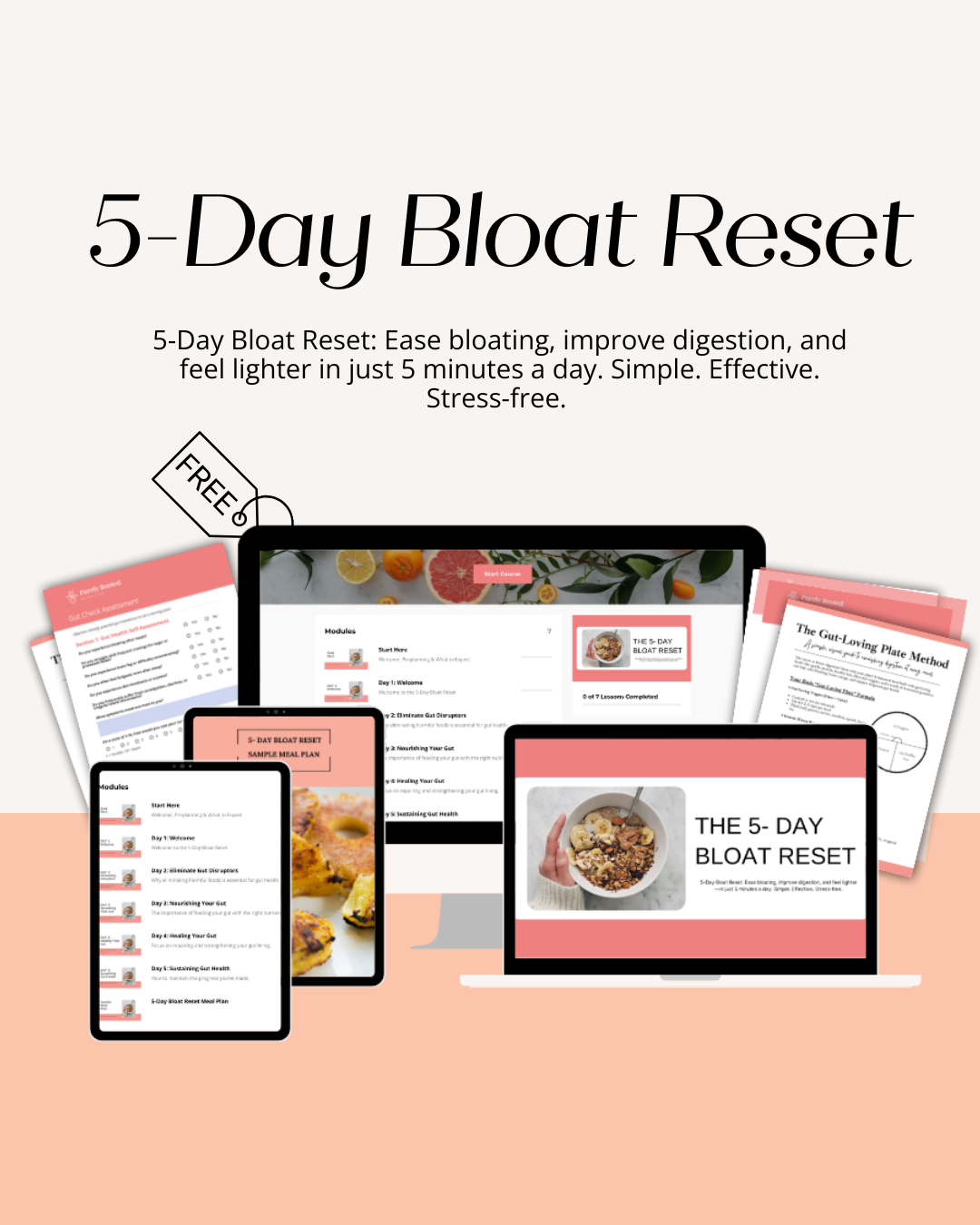
A Balanced Day of Eating as a Gut Health Nutritionist
Oct 16, 2025If you’re struggling with bloating, constipation, or IBS, you already know how much your diet impacts how you feel day to day. From supporting healthy digestion to reducing inflammation, the right foods can make all the difference in your energy, mood, and comfort.
As a Functional Gut Health Practitioner, I’m here to guide you through what a balanced day of eating really looks like for strong, consistent digestion without restriction, overwhelm, or confusion.
In this post, we’ll walk through:
-
How to build a balanced breakfast, lunch, dinner, and snacks that support your gut
-
Meal ideas to reduce bloating and keep your bowels moving consistently
-
Practical tips to make meal planning simple and sustainable
By the end, you’ll have a clear, doable framework for eating in a way that truly supports your gut so you can finally feel calm, comfortable, and bloat-free.
If you’ve been trying to fix your digestion on your own and nothing’s working, I’d love to help you inside The Gut Reset Collective
Balanced Breakfast
Breakfast sets the tone for your digestion and energy all day long. It’s your first opportunity to fuel your body with gut-healing, anti-inflammatory, and blood sugar-balancing nutrients.
A well-balanced breakfast helps:
-
Support healthy motility (hello, morning BMs!)
-
Stabilize blood sugar levels
-
Reduce mid-morning cravings and energy crashes
How to Build a Balanced Gut-Loving Breakfast
When creating your breakfast, aim to include:
Quality Protein: Supports gut lining repair, keeps you full, and stabilizes blood sugar.
Examples: pastured eggs, Greek yogurt, collagen peptides, turkey sausage, or plant-based protein.
Healthy Fats: Soothe inflammation and support hormone balance.
Examples: avocado, nut butter, olive oil, chia seeds, flax seeds.
Fiber-Rich Carbs: Feed your gut bacteria and promote regularity.
Examples: oats, quinoa, sweet potato, berries, or cooked apples.
Mineral-Rich Additions: Support hydration, digestion, and energy.
Examples: a pinch of sea salt, coconut water, or mineral drops in your morning water.
Meal Ideas for Breakfast
-
Scrambled eggs with sautéed spinach, avocado, and sourdough toast
-
Greek yogurt parfait with chia seeds, berries, and drizzle of nut butter
-
Oatmeal cooked with ground flaxseed, cinnamon, and stewed apples
-
Protein smoothie with banana, almond butter, spinach, and collagen

Balanced Lunch
Lunch should give you steady energy through the afternoon while keeping your digestion calm and regular. A nourishing mid-day meal can prevent the dreaded post-lunch bloat or crash.
How to Build a Balanced Gut-Friendly Lunch
Each lunch should include:
Lean Protein: Helps repair tissue and supports digestive enzyme production.
Examples: chicken, wild-caught salmon, lentils, or turkey.
Healthy Fats: Keep you full and calm inflammation.
Examples: olive oil, pumpkin seeds, tahini dressing, or avocado.
Fiber-Rich Vegetables: Feed beneficial bacteria and support detoxification.
Examples: leafy greens, zucchini, asparagus, carrots, or broccoli.
Complex Carbs: Provide energy without spiking blood sugar.
Examples: quinoa, brown rice, roasted root vegetables, or beans (if tolerated).
Meal Ideas for Lunch
-
Salmon bowl with quinoa, cucumber, avocado, and sesame dressing
-
Turkey lettuce wraps with hummus and shredded veggies
-
Warm lentil and roasted veggie salad with olive oil vinaigrette
-
Chicken and rice bowl with sautéed greens and tahini sauce

Balanced Dinner
Dinner is the perfect time to wind down, nourish your body with healing, mineral-rich foods, and support your digestion overnight.
How to Build a Balanced Dinner
Include the following nutrients:
Protein: Supports tissue repair and nighttime metabolism.
Examples: baked fish, chicken thighs, beef, tofu, or eggs.
Healthy Fats: Calm inflammation and aid nutrient absorption.
Examples: olive oil, ghee, avocado oil, nuts, or seeds.
Leafy Greens: Support detoxification and hormone balance.
Examples: spinach, kale, Swiss chard, arugula, or beet greens.
Gut-Friendly Foods: Promote motility and nourish your microbiome.
Examples: cooked veggies, bone broth, fermented sauerkraut, or kimchi (if tolerated).
Meal Ideas for Dinner
-
Baked salmon with roasted carrots and sautéed kale
-
Stir-fry with shrimp, broccoli, and brown rice
-
Slow-cooked chicken with root vegetables and broth
-
Grass-fed beef tacos with cabbage slaw and avocado
Balanced Snacks
Smart snacking keeps your blood sugar stable, prevents overeating, and supports consistent energy.
How to Build a Balanced Snack
A balanced gut-friendly snack should always include:
Protein: Keeps you full and supports enzyme production.
Examples: hard-boiled eggs, Greek yogurt, collagen, or turkey slices.
Healthy Fats: Reduce inflammation and curb cravings.
Examples: almond butter, olives, seeds, or coconut flakes.
Fiber: Supports detoxification and regular bowel movements.
Examples: apple slices, carrot sticks, chia pudding, or flax crackers.
Snack Ideas
-
Apple slices with almond butter
-
Greek yogurt with flaxseed and cinnamon
-
Handful of pumpkin seeds and blueberries
-
Hummus with cucumber and celery sticks
Practical Tips for Easier Meal Planning
Meal planning doesn’t have to feel rigid or overwhelming it’s simply a tool to help you stay consistent and reduce stress around food.
Here’s how to make it doable:
1. Batch Cook Staples:
Cook protein, grains, and veggies in bulk. For example, roast chicken and veggies on Sunday for quick lunches all week.
2. Create Simple Meal Templates:
Think: “Protein + Veg + Carb + Healthy Fat.” Once you have your formula, mix and match ingredients.
3. Keep Gut-Friendly Staples on Hand:
Stock your fridge with sauerkraut, cooked veggies, avocado, and broth so meals come together easily.
4. Prep with Your Energy in Mind:
If mornings are your best time, meal prep early in the day or on weekends so you’re set for the week.
5. Use Your Freezer:
Freeze extra soup, chili, or stir-fry portions for easy grab-and-go dinners.
When you focus on whole, nutrient-dense foods that support digestion, you’ll notice less bloating, more regular BMs, and steadier energy.
If you’re tired of trying to figure it all out alone, I’d love to support you inside The Gut Reset Collective





